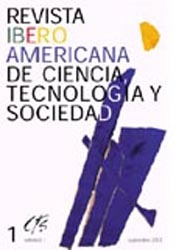Technical Knowledge and Public Discourse
DOI:
https://doi.org/10.52712/issn.1850-0013-1095Keywords:
, science popularization, scientific culture, scientific community, scientific discourse, STS studiesAbstract
This article focuses on the tensions between technical discourse and the necessity of its popularization, emphasizing the idea that the professionals of communication and science have the duty of being understood by lay public (citizens, politicians, etc.) on scientific and technical issues. This is the context from which, adopting the perspectives of sociology of knowledge, the article approaches to the position of various authors involved at the discussion of “Science Wars”. The article remarks the implications that would have to communicate science into the public arena if the dispute between defences of “scientific objectivity” side against positions related to social constructivism is sustained. It affirms that “either-or thinking” is not only unhelpful, but it is wrong and impedes collaboration between representatives of the public and technical experts on issues linked to science and technology. It is necessary to achieve a middle ground, since no matter the adopted point of view, technical professionals should have as their goal the ethical duty to be understood by society, which consents to develop science and technology.
Downloads
References
ASHMAN, Keith; BARINGER, Philip [ed.] (2000): After the Science Wars, Routledge.
BERGER, Peter; LUCKMANN, Thomas (1966): The Social Construction of Reality. A Treatise in the Sociology of Knowledge, New Cork, Garden City, Anchor Books.
BUNGE, Mario (1973): Exact Philosophy: Problems, tools and goals, Dordrecht, Reidel.
CHALK, Rosemary [ed.] (1988), Science, technology and society: Emerging relationships, Washington, American Association for the Advancement of Science.
COLLINS, Randall (1998): The Sociology of Philosophies, Harvard University Press.
DAVISON, Aidan (2001): Technology and the Contested Meanings of Sustainability, State University of New York Press.
DEWEY, John (1934): A Common Faith, New Haven, Yale University Press.
DURBIN, Paul T. (1992): Social Responsibility in Science, Technology and Medicine, Bethlehem, Lehigh University Press.
FEYERABEND, Paul (1975): Against Method, Humanities Press.
FLYVBJERG, Bent (2001): Making Social Science Matter (2001), Cambridge University Press.
LA FOLLETTE, Marcel C. (1990): Making Science Our Own: Public Images of Science 1910 - 1955, Chicago University Press.
LEVITT, Norman (1999): Prometheus Bedeviled. Science and the Contradictions of Contemporary Culture, Rutgers University Press.
McINNIS, Raymond [ed.] (2001): Discourse Synthesis Studies in Historical and Contemporary Social Epistemology, Westport, Praeger Publishers.
MEAD, George (1938): Philosophy of the Act, Chicago University. MERTON, Robert (1965): On the Shoulders of Giants, Free Press.
PARSONS, Keith (2001): Drawing Out Leviathan: Dinosaurs and the Science Wars (2001) Indiana University Press.
PEIRCE, Charles (1877): “The Fixation of Belief”, Popular Science Monthly, November, p. 1-15.
PERA, Marcello (1994): The Discourses of Science, Chicago University Press.
POPPER, Karl (1972): Objective Knowledge: An Evolutionary Approach, Londres, Oxford University Press
SEGERSTRALE, Ullica (2001): Beyond the Science Wars: The Missing Discourse about Science & Society, State University of New York Press.
SOKAL, Alan (1996): “Transgressing the Boundaries: Towards a Transformative Hermeneutics of Quantum Gravity”, Social Text, N°46, spring/summer.
Downloads
Published
How to Cite
Issue
Section
License
Copyright (c) 2025 CC Attribution 4.0

This work is licensed under a Creative Commons Attribution 4.0 International License.
All CTS's issues and academic articles are under a CC-BY license.
Since 2007, CTS has provided open and free access to all its contents, including the complete archive of its quarterly edition and the different products presented in its electronic platform. This decision is based on the belief that offering free access to published materials helps to build a greater and better exchange of knowledge.
In turn, for the quarterly edition, CTS allows institutional and thematic repositories, as well as personal web pages, to self-archive articles in their post-print or editorial version, immediately after the publication of the final version of each issue and under the condition that a link to the original source will be incorporated into the self-archive.











